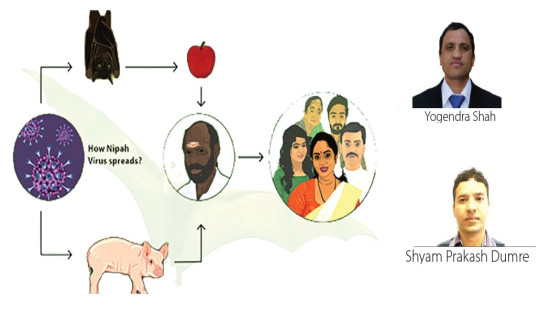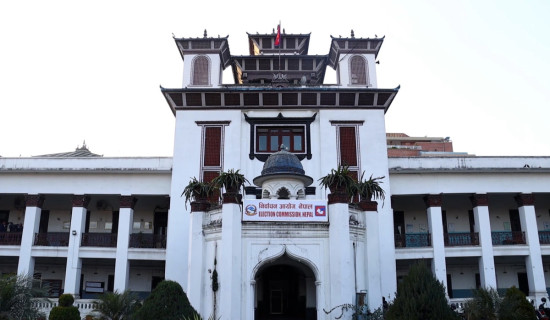- Saturday, 7 February 2026
London Lakhey Expands Nepal Mandal
The success or failure of a work of literature is best judged by how well it is understood and how much it is liked by its intended audience. With this premise in mind, perhaps one can argue that children are the best judges of children’s books. As the primary consumers, their preferences, interests, and reactions are the most accurate indicators of the books’ effectiveness, appeal, and quality.
On this front, Ojesh Singh’s ‘London Lakhey’ scored a glowing appraisal. I asked one of my pre-schooler nieces to read this book and share her thoughts.
Her reaction: “Piney chowpinta na maya yaata Lakhey dey maa khani” (There should be Lakheys to love those living outside the country as well).
Indeed, there should be! And that is why Singh appears to have written this book. To allow children—and even adults—born or living far from the heartlands of their culture to relish in the comforting familiarity of their roots. To be specific to ‘London Lakhey,’ it is an attempt, as author Singh shared with me, to enable people from the Newa community to continue living and preserving their civilisational identity regardless of where they are in the world.
Flipping this proposition, one can say that this book also permits Nepal Mandal to extend its embrace to Newas living beyond its borders. In essence, this book brings Newas all over the globe to the cultural space that is Nepal Mandal and, simultaneously, takes Nepal Mandal global.
The story
‘London Lakhey,’ author Singh’s first book, tells the story of Halucha, a poor carpenter from Maruhiti, Kathmandu, who is forced out of his country by unemployment. Enticed by the possibility of jobs, he moves to the capital of the United Kingdom. However, a lack of fluency in the English language and an absence of support groups distress his mental health, and he ends up alone and homeless.
But thanks to the discovery of his (Newa) community and ethnic roots, he recovers and finds his footing in the foreign land.
Personal associations
The book revolves around three themes: emigration, cultural connection, and support. Among them, the first one is a general concept that almost everyone in Nepal can relate to. Quite possibly, everyone in the country knows someone who has gone abroad for educational or job-related opportunities. The National Population and Housing Census of 2021 estimated that 7.5 per cent of the nation’s population resides abroad. So, emigration is a household story.
But the last two—cultural connection and support—seem to stem from Singh’s own experiences. After all, he too was a local of Maruhiti who ended up in London 25 years ago, just like Halucha. He too discovers his community in the British metropolis (he says as much in the book’s acknowledgement and thanks the Pasa Puchah Guthi, UK, for making him feel at home).
There are just too many specific details about Halucha for him to be fictional. I flat out asked the writer, who is presently in Nepal, if Halucha was an extension of himself. He did not deny it.
Moreover, it was these exact themes that birthed the book, according to Singh. When the 2020 lockdown rules brought on by the COVID-19 pandemic temporarily severed the community bonds he always craved and had maintained, he conceptualised this story to fill that gap. The story obtained its final shape in 2022 and was launched this year on August 16 in Kathmandu, Nepal.
'Stop eating food’
An aerospace engineer and a restauranteur, Singh could have presumably explored countless other ideas for his debut book. But why did he choose to follow the strand of culture? “Because I don’t want our children growing up outside Nepal to be ashamed of who they are,” his answer was as straightforward as it was deep.
“I want kids to know the culturescape they inherently inhabit, the richness they descend from, and the traditional values their families carry.” Singh himself is a father of two children.
‘London Lakhey’ is the latest addition to this “culturescape” that Singh has long been active in developing in Britain. He is the former president and current patron of the Pasa Puchah Guthi, UK, and has organised or actively participated in numerous Newa celebrations like the Biska Jatra or Mha Puja in the country.
“So, you could have centred your story on a Jatra or some other element of the Newa identity. Why did you choose the Lakhey specifically?” I asked further.
“Newas take their culture with them wherever they go,” he responded. “And a chief element of this culture is the Lakhey.”
His efforts, though, have attracted criticism. Many in Nepal have taken offence to the way native Newa festivals have been celebrated abroad and have disliked the supposedly irreverent use of ethnic symbols and religious iconography.
Musician Deepak Bajracharya recently faced social media backlash for featuring a headbanging Lakhey at one of his events.
Singh is aware of this and takes this positively. But he wants people here to understand that the Newa diaspora needs platforms for cultural expression too. “Our culture is engrained in our lives. The latter is not possible without the former.”
He added, “We do not wish to desecrate our customs, nor do we wish to copy the traditions here. We have a different context abroad, and we want to practice our culture within that.”
Singh, who has lived outside of Nepal for a quarter of a century now, continued, “To forbid us (members of the Newa community who live outside Nepal’s borders) from holding these celebrations is like asking us to stop eating food.”
“Are we not entitled to eat Daal Bhaat when outside the country?”
But Singh knows that there are rules he must follow and standards he has to meet when marking Newa festivals. That is why he plans to consult community experts and representatives in Nepal about the most respectful way to proceed.
More books to come
Children are indeed the best people to evaluate children’s books. Thus, I asked my niece if she wanted to read more books like ‘London Lakhey.’ She answered in the affirmative. “Lakhey yaa pasapi maala” (We need stories about the Lakhey’s friends).
Luckily, Singh has plans to deliver. He has eight more stories in his mind and hopes to publish one book a year. “I desire a series that will introduce our civilisation to an international audience,” he said.
He made the right choice then by publishing ‘London Lakhey’ in Nepal Bhasa and English. The Nepal Bhasa presents a native flavour, while the English translation helps non-Nepal Bhasa speakers immerse themselves in the story.
The language is simple and easy to understand, and the colourful illustrations engage readers, particularly young readers, visually. The book is not long, so kids will not get up halfway through. It can also make for a splendid bedtime read.
(Mishra writes on cultural issues.)
















